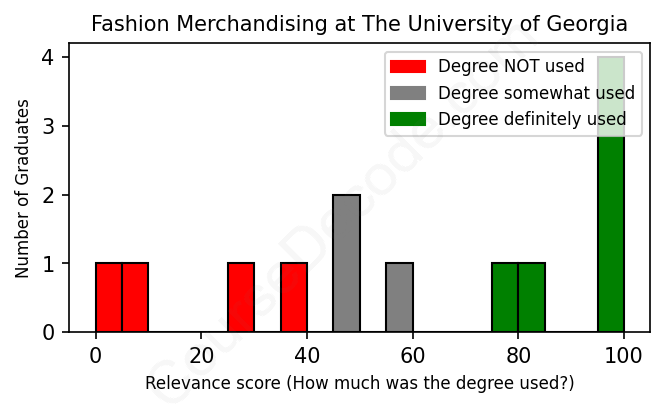
First, some facts. Of the Fashion Merchandising graduates from The University of Georgia we've analyzed , here's how many have used (or NOT used) their degree in their career:

These are estimates based on AI analysis of 13 LinkedIn profiles (see below).
The verdict? Below average. Overall, with an average relevance score of 59%, Fashion Merchandising graduates from The University of Georgia have a lower likelihood (-8%) of finding work in this field compared to the average graduate across all fields:
And for comparison, here's the chart for all profiles we've looked at across all degrees.
Also, after graduating, only 0% of these graduates have pursued further education other than another Bachelor's degree (such as a Masters degree or other), compared to the average across all profiles of 35%. This suggests a Bachelors degree is enough for most Fashion Merchandising graduates, and it's normal to look for work straight after graduation.
See the details:
|
Relevance score: 8% We think this person has NOT gone into a career related to their degree. We think this person has NOT gone into a career related to their degree.
DEGREE INFOGraduated in 2011 from The University of Georgia with a Bachelor of Science in Fashion Merchandising. No other secondary education since. JOB HISTORY SINCE GRADUATIONSoft Trim Engineer Toyota Boshoku America Jul 2012 - Apr 2014 Senior Pattern Maker  Freedman Seating Apr 2014 - Dec 2014 Trim Engineer  Futuris Automotive Jan 2015 - Jun 2016 VP, Sr. Business Planning Analyst  SunTrust Jun 2016 - Jan 2018 Group Vice President, Business Planning Manager  SunTrust Feb 2018 - Sep 2018 Group Vice President, Strategic Change Management  SunTrust Sep 2018 - May 2019 Manager, Corporate Strategy  UPS May 2019 - Oct 2022 Global Brand Director  UPS Sep 2022 - Present ABOUTNo information provided. |
The top 10 most common jobs done by the graduates we've analyzed (ranked most common to least) are:
Looking through the job history of graduates from the University of Georgia with a degree in Fashion Merchandising, it’s pretty clear that while some did land jobs directly related to fashion, a lot of others ventured into roles that don’t fully align with their studies. Many of the common positions taken on were in sales, logistics, or operations, like Sales Representatives or Managers where the day-to-day tasks often involved customer service or general business management instead of the specific fashion skills they learned. For instance, roles like Executive Team Leader or Global Pricing Analyst show that graduates leaned towards broader business functions, proving that fashion merchandising isn’t the only path you can take with that degree.
On the flip side, there are definitely graduates who secured roles that directly tapped into their fashion merchandising knowledge. For example, positions such as Assistant Buyer and Fashion Assistant involved tasks like product selection and trend analysis, which are pretty much at the core of what fashion merchandising is all about. Some even took on roles like Visual Merchandiser and E-Commerce Buyer, closely aligning with their studies and putting those skills to good use. So, while there’s a mix in the job market—people either using their fashion know-how or branching out into different areas—it’s safe to say that a degree in Fashion Merchandising paves the way for a variety of career paths, even if many aren’t strictly related to fashion merchandising itself.
Here is a visual representation of the most common words in job titles for Fashion Merchandising graduates (this is across all Fashion Merchandising graduates we've analyzed, not just those who went to The University of Georgia):

The graduates from The University of Georgia with a degree in Fashion Merchandising have navigated a variety of career paths that often begin in sales and customer-facing roles. For many, their first jobs after graduation seem to be foundational as they step into positions like sales representatives, assistant roles in merchandising, or management trainees at retail giants like Target. While their early career choices show a blend of retail and merchandising experience, not all of them stay strictly within the fashion merchandising domain. For instance, some have ventured into areas like supply chain management, human resources, or even completely unrelated fields like finance and graphic design. This indicates a level of adaptability, showcasing that the skills learned in the program can be beneficial in various industries.
Fast forward five to ten years, and you see a mixed bag of outcomes. A number of graduates have successfully climbed the corporate ladder, landing strategic managerial roles within well-known companies like Procter & Gamble and UPS. Others have taken entrepreneurial routes, becoming business owners or freelancers in creative fields. However, it's also evident that some graduates have drifted away from core fashion merchandising roles and found themselves in jobs that, while still rewarding, are not directly related to their original degree. This suggests that a degree in Fashion Merchandising provides a strong foundation, but the path one takes can vary greatly depending on personal interests, market trends, and individual career aspirations.
Honestly, getting a Bachelor’s degree in Fashion Merchandising can be a mix of challenging and manageable, depending on your passion for the subject. If you’re really into fashion and have a knack for creativity, you might find the coursework fun and engaging, which makes it feel easier. There’s definitely a good amount of studying involved, especially when it comes to understanding trends, marketing, and consumer behavior. Plus, you’ll have projects that might require some hands-on work, like styling or merchandising displays. Overall, it’s not the easiest degree out there, but if fashion excites you, it can feel pretty rewarding and enjoyable.
Most commonly, in the LinkedIn profiles we've looked at, it takes people 2 years to finish a Bachelor degree in Fashion Merchandising.
Looking at the career paths of these UGA Fashion Merchandising graduates, you can definitely see a mix of job types and experience levels that hint at their potential income. The earlier graduates, like those from 2010 and 2011, seem to have kicked off with some decent roles in sales and logistics, which could mean they started off earning a fair amount, especially as they moved up in companies like 3M and Procter & Gamble. Those who graduated more recently, like in 2020 and 2022, are still working their way up, but they’re landing roles in retail and merchandising that definitely have room for good salaries as they gain experience. Overall, it looks like they’re on a pretty solid trajectory, and while salaries may vary, it seems like many of them are making decent money, especially as they climb the ladder and take on more responsibilities.
Here is a visual representation of the most common words seen in the "about" section of LinkedIn profiles who have a Bachelor degree in Fashion Merchandising (this is across all Fashion Merchandising graduates we've analyzed, not just those who went to The University of Georgia). This may or may not be useful:

Here are all colleges offering a Bachelor degree in Fashion Merchandising (ordered by the average relevance score of their Fashion Merchandising graduates, best to worst) where we have analyzed at least 10 of their graduates:
| College | Score | Count |
|---|---|---|
 LIM College LIM College
|
70 | 43 |
 University of North Texas University of North Texas
|
69 | 20 |
 Kent State University Kent State University
|
68 | 49 |
 Fashion Institute of Technology Fashion Institute of Technology
|
66 | 21 |
 Philadelphia University Philadelphia University
|
62 | 14 |
 The University of Georgia The University of Georgia
|
59 | 13 |
 California State University-Long Beach California State University-Long Beach
|
56 | 12 |
 Texas State University Texas State University
|
54 | 24 |
 Marist College Marist College
|
54 | 17 |